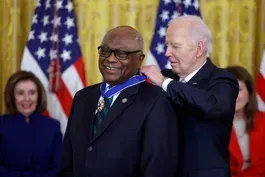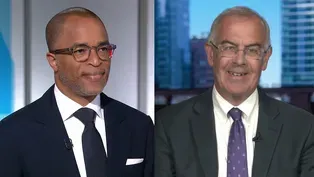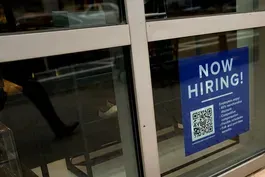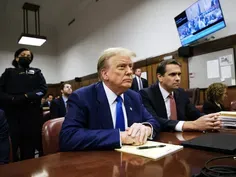
Google antitrust trial could change how we use the internet
Clip: 5/3/2024 | 5m 30sVideo has Closed Captions
Why the Google antitrust trial could change how we use the internet
A landmark antitrust trial between the Department of Justice and Google is coming to an end. The tech giant is accused of monopolizing the internet search market, sidelining competitors and harming consumers. The DOJ claims Google struck illegal deals, but the company argues it has the best search engine. Stephanie Sy discussed the case with Rebecca Allensworth of Vanderbilt Law School.
Problems with Closed Captions? Closed Captioning Feedback
Problems with Closed Captions? Closed Captioning Feedback
Major corporate funding for the PBS News Hour is provided by BDO, BNSF, Consumer Cellular, American Cruise Lines, and Raymond James. Funding for the PBS NewsHour Weekend is provided by...

Google antitrust trial could change how we use the internet
Clip: 5/3/2024 | 5m 30sVideo has Closed Captions
A landmark antitrust trial between the Department of Justice and Google is coming to an end. The tech giant is accused of monopolizing the internet search market, sidelining competitors and harming consumers. The DOJ claims Google struck illegal deals, but the company argues it has the best search engine. Stephanie Sy discussed the case with Rebecca Allensworth of Vanderbilt Law School.
Problems with Closed Captions? Closed Captioning Feedback
How to Watch PBS News Hour
PBS News Hour is available to stream on pbs.org and the free PBS App, available on iPhone, Apple TV, Android TV, Android smartphones, Amazon Fire TV, Amazon Fire Tablet, Roku, Samsung Smart TV, and Vizio.
Providing Support for PBS.org
Learn Moreabout PBS online sponsorshipWILLIAM BRANGHAM: A landmark antitrust trial between the Department of Justice and Google is coming to an end, with both parties delivering closing arguments.
As Stephanie Sy explains, Google is accused of monopolizing the Internet search market, sidelining competitors, and harming consumers.
STEPHANIE SY: William, the Justice Department claims that Google struck illegal deals with companies like Apple, paying them billions of dollars to be the default search engine on phones and other devices and crowding out competition.
Google argues it has the best search engine, and that's why consumers choose it.
The decision on this case may not only change the way Google does business.
It could lead to a breakup of the company.
For more, I'm joined by Rebecca Allensworth, who teaches contract and antitrust law at Vanderbilt Law School.
Rebecca, it's great to have you with us on the "NewsHour."
So, first, set the stage for us, because the Justice Department's under both former President Trump and now President Biden have been trying to rein in tech monopolies in various cases brought against these powerful companies.
But this was the first to go to trial last fall.
What was the most compelling testimony you heard on both sides of this?
REBECCA ALLENSWORTH, Vanderbilt Law School: Well, I think, on the side of the government, they really made a good case by pointing out Microsoft's difficulty in entering this market.
Microsoft wanted to make Bing something that was a real rival for Google, and they just could not get past these de facto exclusive deals that Google had with Apple and with Android.
I think that's really strong.
I think the best testimony on Google's side is the idea that Google's a great product.
We all sort of prefer it.
If we were given a choice, we would probably pick it.
And so what exactly does the government want here, a choice screen where we're all just going to click Google anyway?
Those, I think, are the strongest arguments that I heard on both sides.
STEPHANIE SY: And, of course, you had a big tech giant, Satya Nadella, testifying, as well as smaller search engine companies that say they're being crowded out.
So now you have closing arguments.
What has stood out to you about these last arguments and what the district judge in the case, Amit Mehta, has said?
REBECCA ALLENSWORTH: He seems skeptical of the idea that Google is not a monopolist.
They have to -- the government has to prove two things to prevail in this case.
First, they have to show that Google has monopoly power, and they have to show that they used bad acts or exclusionary conduct to maintain that power.
And I think that, as I -- my belief about the merits of this case is that Google is definitely a monopolist, and Mehta seemed to think that too.
He was very skeptical of arguments that Google was making that they compete with vertical search places like when you go to Amazon to search for a product or you go to Expedia to search for a travel opportunity.
He said those are not the same thing as general search.
So he's tipped his hand a little bit in that department.
He seemed a little bit more even in the way he was talking about the bad acts or the exclusionary behavior.
But he did say the big question, which is if defaults don't matter and if competition is just to click away, why are you, Google, paying Apple $23 billion a year to be that default?
STEPHANIE SY: And from what I understand, Google has like 90 percent of the search market as a result.
This case is considered a test case of whether U.S. antitrust law can adequately address the novel problems presented by new technologies.
How hard is it to win these types of antitrust cases and has the law evolved enough to deal with the rapid developments we have seen in tech?
REBECCA ALLENSWORTH: So these cases are very hard to win.
Antitrust law has itself evolved to be very unfriendly for plaintiffs, like -- including the government.
But I do think that antitrust law is up to this.
This is very analogous in some ways to the Microsoft case, which was the biggest tech monopolization case before this one from the late '90s.
And, actually, all along, since the passage of the Sherman Act, there have been networked industries, industries like the railroads, where you have to kind of treat the whole thing as a thing of value to consumers, that you want something big and networked, you don't want to break it up.
And so we have some good precedents and some good case law that would be applicable to this dispute.
But, like all antitrust cases, this one is hard to win.
STEPHANIE SY: This has been called the biggest antitrust case in the U.S. in a quarter-century.
But depending on how this judge rules, and that may take months, it may have no effect, right?
Or it could lead to major changes if he rules against Google, or it could just lead to the status quo.
REBECCA ALLENSWORTH: Well, I think it's unlikely to lead to a breakup.
I think that it's possible the government will ask for that, but I don't think they're likely to get it.
I think what they are likely to get if they win is a pronouncement that Google's no longer allowed to enjoy this default status on our devices.
The question then becomes, OK, so if there is a choice screen, will consumers really switch away?
Will competition be possible?
And while that seems hard to believe that even I personally would choose something other than Google, it does seem that Google is worried about that, to the tune of $23 billion a year in the case of Apple.
So it could really lead to some opening up of competition.
We will just have to see.
STEPHANIE SY: Rebecca Allensworth worth of Vanderbilt Law School, thanks so much for your expertise.
Thank you.
Biden awards Medal of Freedom to 19 at White House
Video has Closed Captions
Biden awards Medal of Freedom to 19 who 'kept faith in a better tomorrow' (2m 24s)
Brooks and Capehart on Trump's vision for a 2nd term
Video has Closed Captions
Brooks and Capehart on campus protests and Trump's vision for a 2nd term (10m 26s)
Gaza journalist fights to protect family while covering war
Video has Closed Captions
Palestinian journalist describes fight to protect his family while covering war in Gaza (5m)
News Wrap: Report shows interest rates slowing job growth
Video has Closed Captions
News Wrap: Labor report shows high interest rates finally slowing job growth (5m 31s)
Prisons with ISIS members a radicalization breeding ground
Video has Closed Captions
Prisons holding ISIS members in Syria a breeding ground for radicalization, officials say (9m 13s)
Vietnamese Americans honor communities in new art exhibit
Video has Closed Captions
Vietnamese American artists on Gulf Coast honor their community's success and struggles (7m 36s)
What Hope Hicks said on the stand in Trump hush money trial
Video has Closed Captions
What Hope Hicks said on the stand in Trump’s hush money trial (4m 48s)
Providing Support for PBS.org
Learn Moreabout PBS online sponsorshipSupport for PBS provided by:
Major corporate funding for the PBS News Hour is provided by BDO, BNSF, Consumer Cellular, American Cruise Lines, and Raymond James. Funding for the PBS NewsHour Weekend is provided by...


















